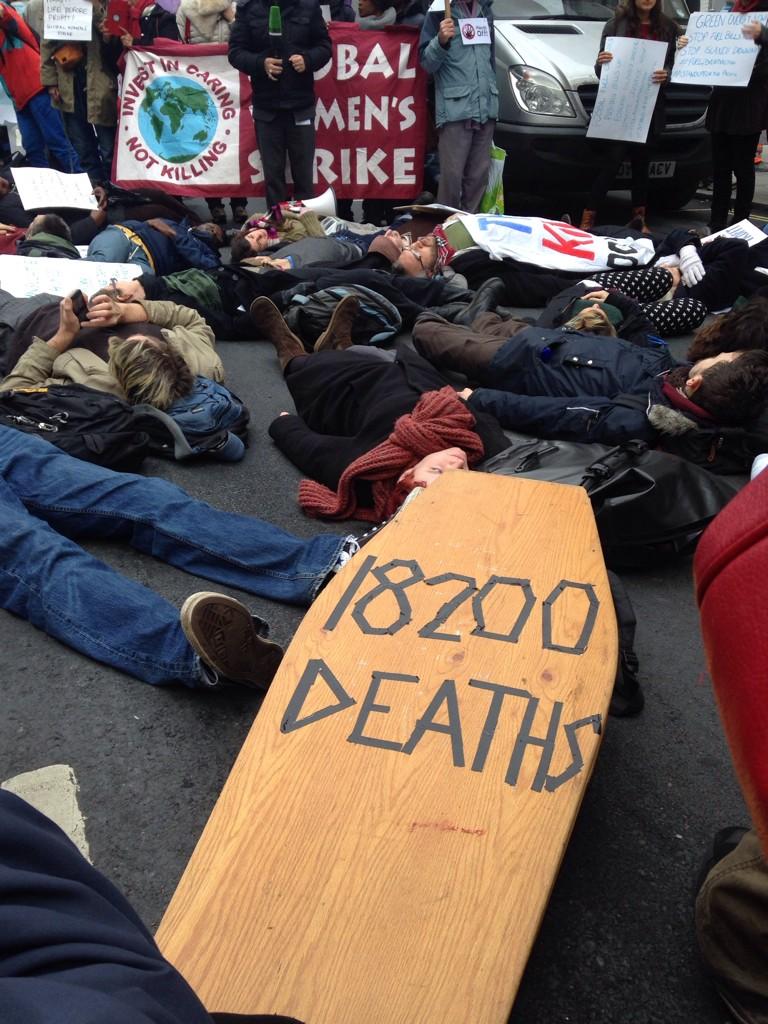Clare Birkett, MSc Environment, Politics and Development
Last Friday, SOAS students joined around 200 people in central London at a protest against rocketing energy prices and their devastating effects on students, pensioners and other vulnerable groups.
The protest was timed to coincide with the release of a government report which estimated that there were 18,200 excess winter deaths in the UK in 2013-2014. The news comes soon after a recent survey which found that 78% of surveyed students felt uncomfortably cold at home over the winter.
Protesters marched to Energy UK on Regent Street, the lobbying body for the big six UK energy companies, where they staged a ‘die-in’, lying down in the middle of the road to represent the thousands that die every year from the cold.
“Thousands die from fuel poverty while the big six energy companies make billions in profits,” said Eva Jasiewic from Fuel Poverty Action.
Profits made by the big six energy companies have leapt from £8 per customer in 2009 to an estimated £102 this year, while energy prices have increased a massive 30% in the last four years. At the same time, living costs including rent have increased dramatically, while wages have stagnated.
68% of the UK public want energy companies to be nationalised, according to a recent YouGov survey. But protesters on Friday asked for a step further – an energy system under the control of people and communities, not private companies or the state. “Cheap and clean energy is only possible if we put control back into public hands,” said Eva Jasiewic, to the backdrop of chants of “Public energy now!”
While the majority of excess winter deaths occur in the over 75s age group, fuel poverty is an issue that seriously affects students.
“We’re supposed to accept that living in a cold home is just part of the university experience,” said Sam Tippet, a SOAS masters student studying Global Energy and Climate Policy, who participated in the die-in. “But heating should not be a luxury. Clean and accessible energy is fundamental to our basic survival. We must claim democratic control of it.”
A recent survey by Friends of the Earth and the NUS found that 67% of surveyed students have worn outdoor hats, gloves and scarves in their own home to keep warm. As well as the health implications, people living in cold homes are shown to be 5 times more likely to suffer from depression.
Ann Robinson, Director of Consumer Policy at uSwitch.com, says, “When it comes to affordable energy the country is at crisis point. Consumers are being forced to turn down and switch off in an attempt to shield themselves from the impact of higher fuel bills. This winter we will be seeing even more going without adequate heating for fear of racking up a bill they cannot afford – this is the grim reality for many households in Britain today.”
In light of these statistics, SOAS Students’ Union voted last month to support Fuel Poverty Action’s Energy Bill of Rights, which sets out what people’s energy rights should be. The vote means that the union is now responsible for supporting students struggling to pay their energy bills, and suffering from cold housing.
A representative from the All African Women’s Group present at the protest explained how migrants are another vulnerable group that are disproportionately affected by fuel poverty: “We fled multinationals’ proxy wars to freeze from their greed in the UK,” she said.
Experts are expecting the coming winter to be the coldest on record, in contrast to last year’s very mild winter. With rising energy prices, bills are likely to hit students’ pockets hard if energy companies don’t temper their prices and if the government doesn’t adequately support those at risk of fuel poverty.
